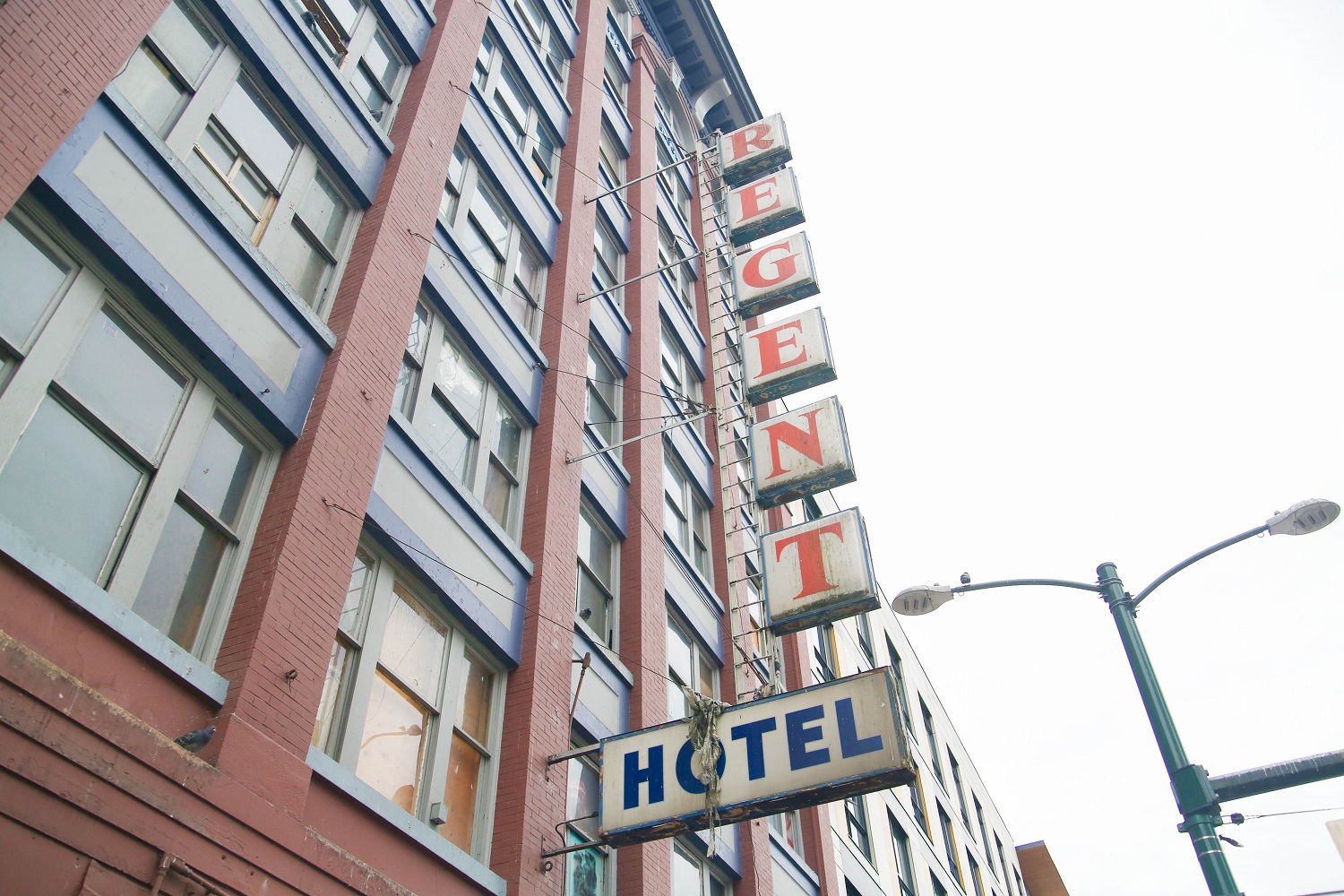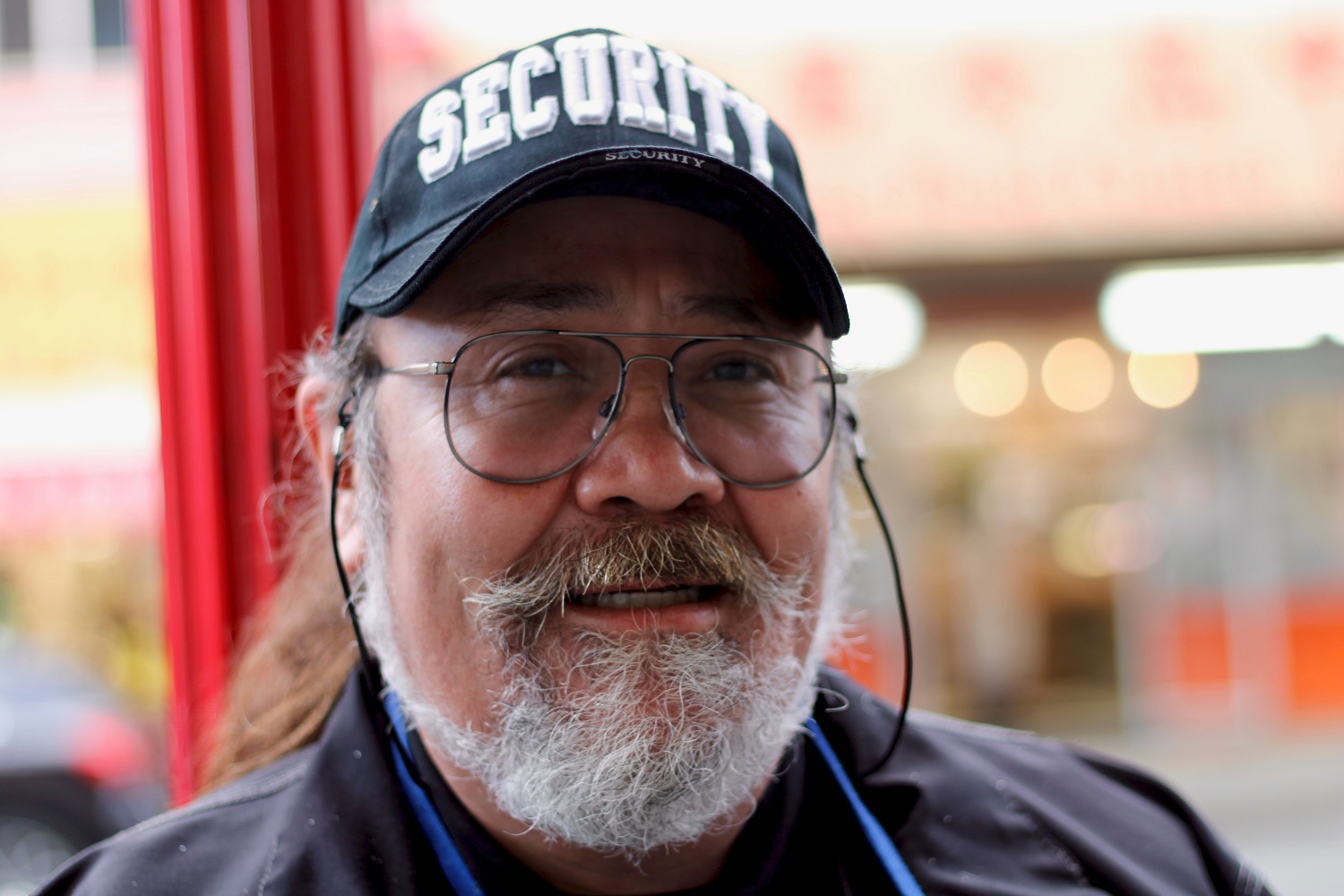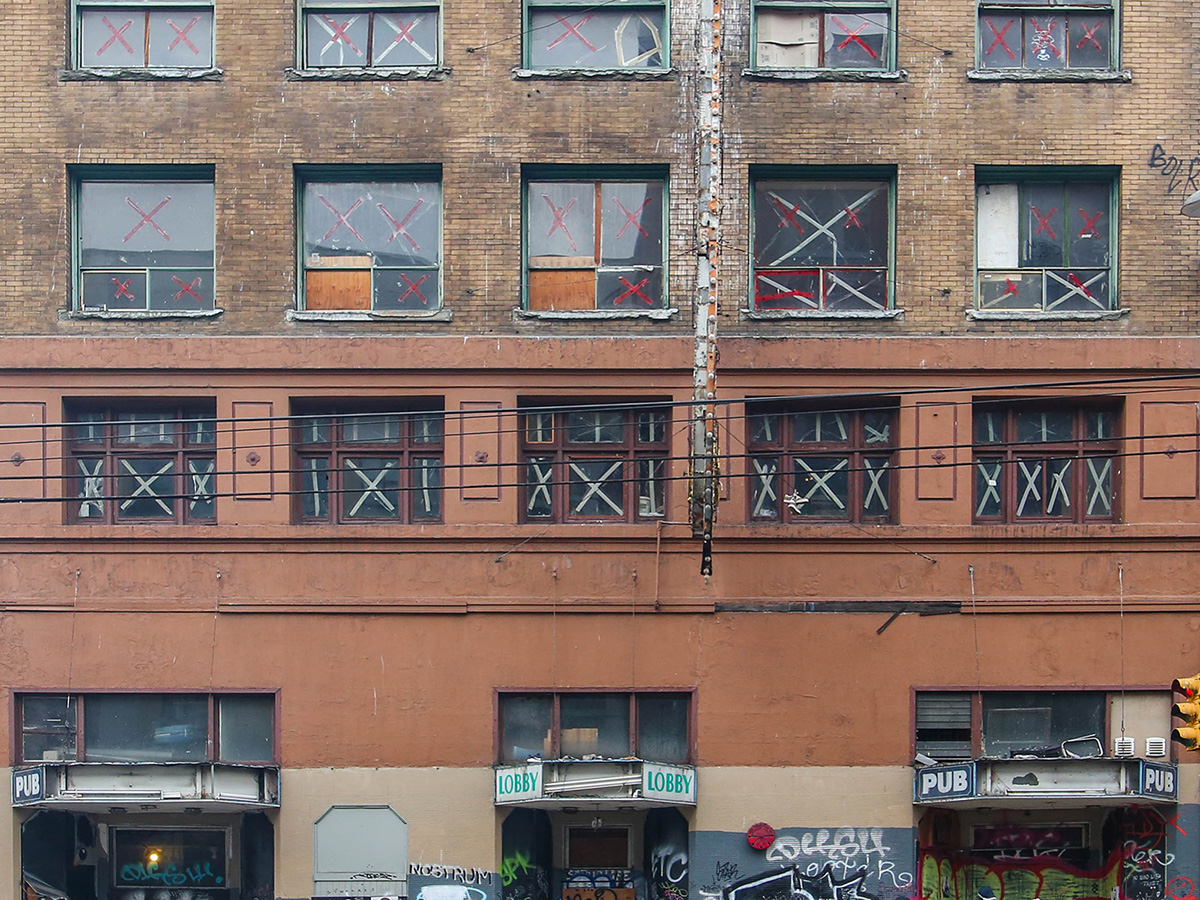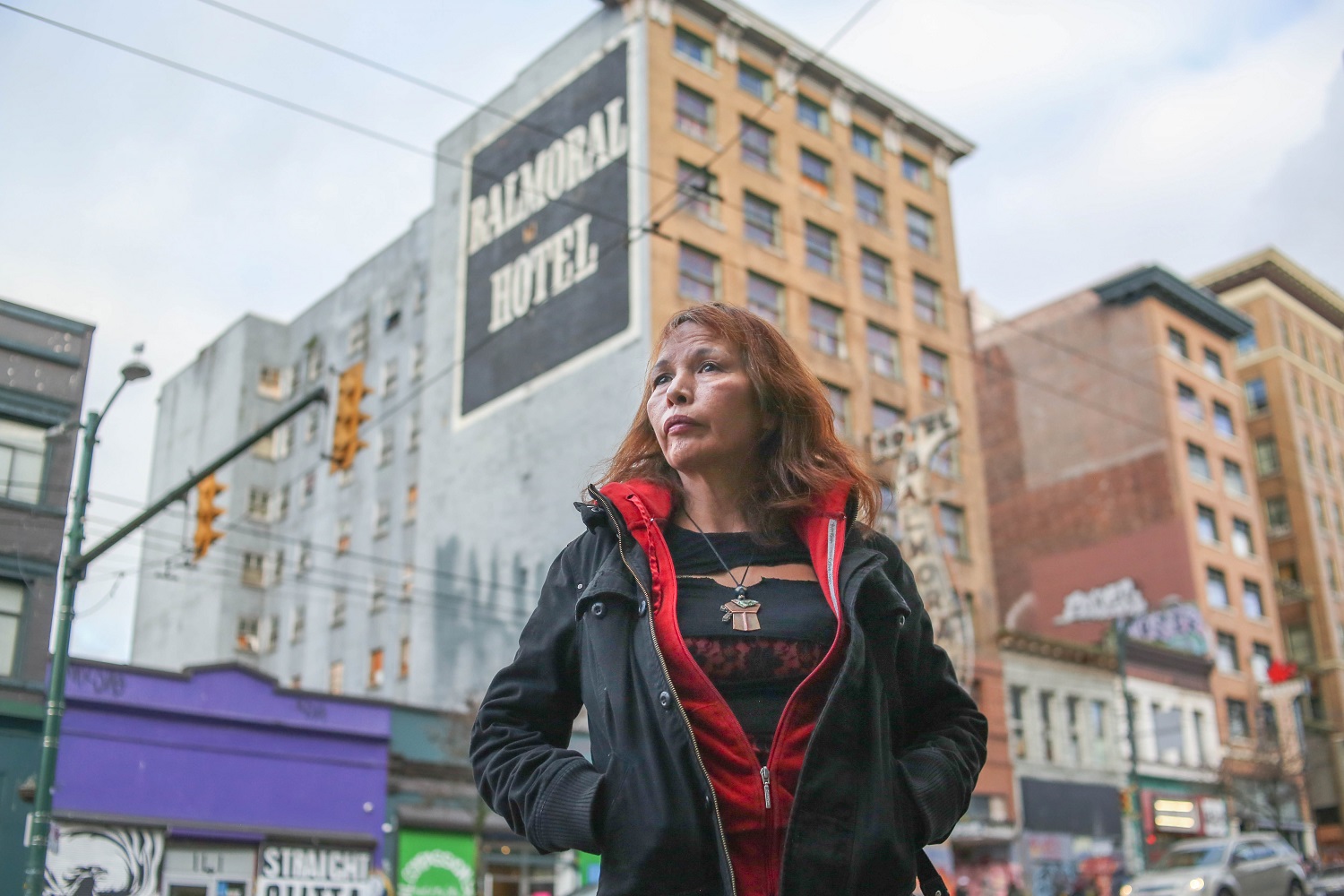When Gunargie O’Sullivan looks at the Balmoral Hotel, she thinks about her mother, screaming in pain while in labour. She died inside the hotel during the birth of her third child in 1972.
Standing in the shadow of the Regent Hotel across the street on East Hastings, O’Sullivan remembers her sister-in-law, discovered four days after dying of a drug overdose in the mid-2000s, surrounded by a mountain of needles.
DJ Joe lived in the Balmoral for 28 years, along with her mother and daughter. All three had health issues Joe believes came from living in rooms covered in black mould that was never cleaned up after water damage from a fire.
Joe now has chronic obstructive pulmonary disease. Her mother and daughter died recently, and Joe believes living in the Balmoral shortened their lives.
Jack Gates lived at the Regent Hotel from 2016 to 2018. He recalls seeing people being dragged from rooms they’d paid for. After he spoke up about the poor living conditions — no heat or hot water, no electricity, toilets that didn’t work — he was afraid every day.
“I watched people overdose and die,” Gates said. “I just couldn’t handle watching people go down and the Sahotas really not doing anything about it, just continuously taking their rent money, illegally evicting people.”
In the Downtown Eastside, it’s common to hear people voice a suspicion that bodies are buried inside the walls of the East Hastings hotels, or maybe hidden under staircases.
There’s no evidence there are actually bodies buried inside the buildings. But a lot of bad things have happened to people in the hotels, while the people who had the power to do something about the abuse looked the other way.
For the past 30 years, the elusive owners of the hotels have been the Sahota family — three elderly siblings who live in a mansion in Shaughnessy and never speak to the media, except to decline interview requests. Gurdyal, Pal and Parkash Sahota own a large portfolio of low-rent buildings and have a long history of failing to maintain their properties.
These days, there’s new hope for the Regent and Balmoral, long considered the most neglected single-room occupancy hotels in Vancouver. On Dec. 4, The Tyee reported that land title records showed that both buildings are now owned by the City of Vancouver — a transfer quietly completed on Nov. 13.
The news came a year after city council took the extraordinary step of voting to expropriate the two hotels. The City of Vancouver intends to either renovate or redevelop the sites into low-income housing. The Balmoral will likely have to be torn down because it is so damaged, although the façade may be retained, Coun. Pete Fry told The Tyee.
In order to get the Sahotas to relinquish the buildings, the city agreed not to reveal the terms of the purchase. However, the Globe and Mail has reported the city paid more than $7.5 million, citing unnamed sources with knowledge of the agreement.
City staff say the deal allows the city to avoid a lengthy court battle and move forward on redeveloping the buildings: The Balmoral has sat empty since 2017, and the Regent since 2018, after the City of Vancouver condemned the buildings and relocated tenants with the help of BC Housing.

The city’s expropriation effort valued the properties at $1 each because of the cost of remediating them. In court documents challenging the expropriation, the Sahotas said they had been offered $14 million for the Balmoral by an interested buyer on June 8, 2018.
As negotiations on a deal continued this summer, the city offered to buy five Sahota-owned SRO buildings for just their land value on June 28. On July 6, the city offered $6 million for both the Regent and the Balmoral. The Sahotas rejected the city’s offers, saying they were not “fair market value.”
In 2016, the Balmoral was valued at $10 million and the Regent was valued at $12 million. But after the city condemned the buildings, their value plunged: today, the Balmoral and the Regent have an assessed value of around $3 million each.
The city and the Sahotas were back at the negotiating table in early November. One condition in particular was very important to the Sahotas, according to the city.
“Confidentiality regarding pricing is a condition on which the owners insisted as a prerequisite to resolving the litigation,” staff wrote in an email sent to councillors, which Coun. Pete Fry shared with The Tyee.
Fry said keeping the price confidential could also reduce the risk of real estate speculation that could push up the price of other privately held SRO buildings. The city recently approved an ambitious plan to buy over 100 of the buildings to make sure they remain affordable rental buildings for the city’s poorest residents.
John Alexander, a Victoria-based lawyer who specializes in real estate, said land transactions are often dealt with in closed city council meetings.
“If you paid $1,000 a square foot over here and you’ve got an acquisition plan underway, you don’t want all the other owners to know,” Alexander said.
But Ron Usher, a lawyer for the Notaries Society of BC, said there needs to be a compelling reason to hide how much the city paid.
“When we as the public are trying to evaluate: what was the cost of this for the social good we’re trying to get? You can’t really evaluate that unless you know what got spent,” Usher said.
“We need to have that disclosure, and there has to be some pretty darn compelling reason to not disclose it. It’s hard to see who would be hurt by that.”
Gates and O’Sullivan said it was important to know how much the city paid.
“I think it’s important to know, because many people feel the owners of the Balmoral and Regent failed the people,” and repeatedly ignored city bylaws and provincial rent laws, O’Sullivan said. While the Sahotas were taken to court many times and paid hundreds of thousands of dollars in penalties, conditions never really improved for tenants.
“They should have been held accountable for failing the tenants in those ways.”
Gates says he feels the Sahotas shouldn’t even have been given the $1 the city said each of the properties was worth.
“I am disappointed they didn’t just come out in the open and just tell everyone how much they paid,” he said. But, Gates added, he’s also excited and relieved to see the properties go to the city to be used for housing in the Downtown Eastside.

Beyond questions about the public funds that have gone to the Sahotas, O’Sullivan said there needs to be a full accounting of what happened at the hotels even before the Sahotas owned them.
O’Sullivan would like to see an investigation into the role of the hotels when it comes to the issue of murdered and missing Indigenous women, and their place as both a refuge and a dangerous place for Indigenous people whose families were torn apart by racist colonial policies like residential schools and the '60s Scoop.
O’Sullivan told the story of her mother, who came from the Tlowitsis Nation on Vancouver Island. O’Sullivan said her mother ended up in the Downtown Eastside and lived at the Balmoral, after she left residential school at 16 with few life skills. She had two babies, O’Sullivan and her brother, who were both taken into care and adopted in the 1960s. When it came time to have her third baby, O’Sullivan says she believes her mother was too afraid to go to a hospital.
“Imagine this woman being pregnant in the Balmoral Hotel with another child, giving birth, too afraid to go to the hospital — to be dependent on the health-care system because she knows if she does, she’ll lose her child,” O’Sullivan said.

David Eby is now B.C.’s attorney general and minister responsible for housing. But back in the mid-2000s, he was a lawyer for Pivot Legal, a non-profit organization devoted to advocating for marginalized people.
In 2006, he wrote a scathing report documenting illegal evictions and the health problems caused by pest infestations and crumbling buildings.
Eby said that, as a lawyer, he found himself urging the city not to take away the business licenses of “slumlords” — because if the buildings were shut down, his clients would be homeless.
“People who I knew to be slumlords and incredibly problematic actors were the only people willing to house my clients,” Eby told The Tyee.
When it comes to the Balmoral and the Regent, he said the city should have enforced its standards of maintenance bylaw, which allows the city to make repairs and bill the owner.
Eby says the province is committed to help the city redevelop the Regent and Balmoral, although he said it’s too early to say how much funding it would provide.
He also confirmed the province will support the city in its plan to buy dozens more privately held SRO buildings, although he said B.C. will also be looking to the federal government for help.
Eby said he’s asked BC Housing to look at a model of rent control for SRO buildings that wouldn’t allow owners to evict tenants and increase rents.
Current limits on rent increases only apply as long as the same tenant remains in the unit. Vacancy control means the rent increase limits remain in place when a tenant moves out and a new person moves in.
Tenant advocates have been pushing the government to introduce the model for all rental housing, but the province has rejected the idea, saying it could lead to fewer new rental buildings being built.
Eby emphasized vacancy control would only be considered for single-room occupancy hotels, a unique form of housing that houses very low-income people and is rapidly being lost to gentrification.
By using its power to expropriate, Vancouver has sent a powerful message, Eby said, “demonstrating to other cities that they do not need to tolerate problem properties, that the province will work with them to support the tenants to make sure that people aren't displaced.” ![]()
Read more: Housing, Municipal Politics, Urban Planning + Architecture
















Tyee Commenting Guidelines
Comments that violate guidelines risk being deleted, and violations may result in a temporary or permanent user ban. Maintain the spirit of good conversation to stay in the discussion.
*Please note The Tyee is not a forum for spreading misinformation about COVID-19, denying its existence or minimizing its risk to public health.
Do:
Do not: